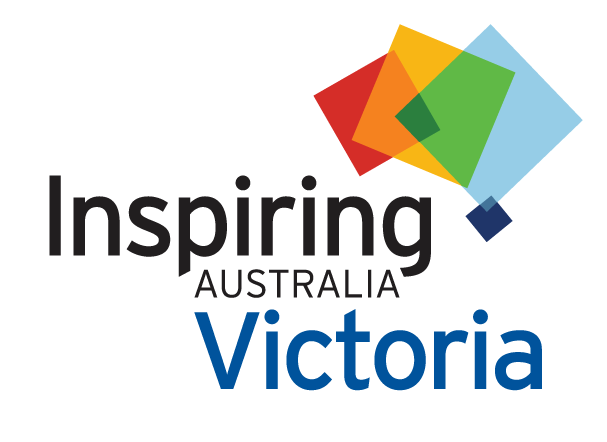Possible Impossibles – unlocking the role of science in shaping our society

On Sunday, 23th of August, the Possible Impossibles online forum was live-streamed by Parliament of Victoria, with ABC’s award-winning science journalist, Natasha Mitchell, hosting the event. She spoke with four scientific leaders in the fields of new technologies, medical science, environmental science and space exploration to discuss the role of science in shaping our lives in a post COVID-19 future.
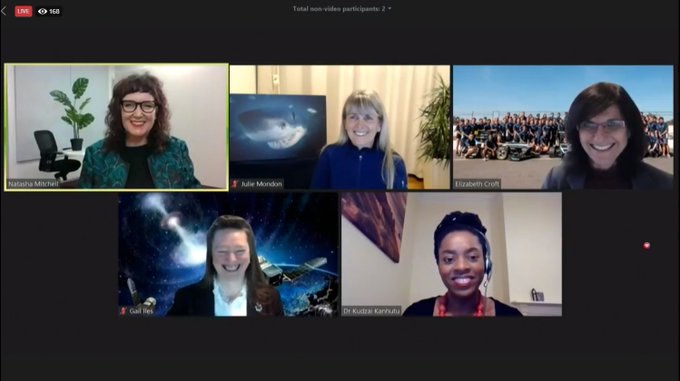
Top(L-R): Natasha Mitchell, A/Prof. Julie Mondon, Prof. Elizabeth Croft.
Bottom (L-R): Dr Gail Iles, Dr Kudzai Kanhutu.
What follows is a summary of the key points made by each speaker, prepared by Priya Mohandoss.
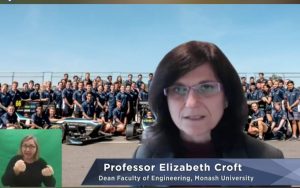
New technologies
Professor Elizabeth Croft, Dean of Faculty of Engineering, Monash University
- Elizabeth believes that Australia needs to boost its capacity to be self-sufficient and effective in the field of local manufacturing through the use of automation, robotics and artificial intelligence in order to provide jobs and bolster our economy.
- Well-designed robotic systems can work alongside healthcare providers and be programmed to do activities such as food delivery to reduce human exposure, surveillance to track patients and the decontamination of healthcare facilities after hours using UV light remove all viruses. In turn, this would then offer protection to both the patients and healthcare providers.
- Elizabeth believes that studying a broad range of disciplines at a tertiary level would be beneficial and allow for more future prospects, such as in industry.
- Similar to the application of computers, the workforce will learn to operate, create, design and deploy robotics too, and this will lend itself to a whole new range of fields that are yet to be explored.
- The idea of bringing robotics and people to work together in a number of industries means that we will be able to create a new future using the combination of both social sciences and technologies. This situation would aid our economy and offer a platform for Australia to showcase to the world what is achievable through invention and innovation.
- Technology in general will change our world, so we need to have the appropriate expertise on board to ensure that it is used appropriately to create a safe, ethical and beneficial future and solve challenges that impact on humanity.
- While there is much knowledge in terms of how electric vehicles can be used, automation is still something that is under investigation. This is especially true for non-standard cases, such as darkness, lack of observation of animals or people approaching the road and any other encounters that a driver might come across. Consequently, there is a need to establish a regulatory framework that would consider the ethical, legal and governmental certification for the management of future automated vehicles.
- With renewable energy, the sun, wind or hydrogen can be used to generate electricity. These renewables are a real future and have the capacity to deliver when travelling further distances in automated vehicles.
- The younger generation will do things differently. When it comes to travel, they will use more public transport and consider belonging to a car share program to share autonomous vehicles. Consequently, there will be a decrease in car usage and the amount of pollution.
- More scientists and engineers are needed in politics. Governments need to take advantage and keep in contact with Australian universities and research institutions to access the knowledge and advice offered and furthermore, use this to assist them with implementing policies and decision-making.
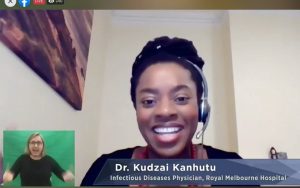 Medical Science
Medical Science
Dr Kudzai Kanhutu, Deputy Chief Medical Information Officer, Royal Melbourne Hospital and Infectious Diseases Physician
- The use of robotics in healthcare settings can assist workers in terms of alleviating laborious work and assisting in the occupational healthcare environment. For instance, robotic systems can be used in aged care for stroke recovery patients to monitor body movements and reposition patients when needed. Furthermore, they could also be designed for the administration of prescription medicines so that they take care of the complex dosage calculations.
- While human interaction is still a vital part of looking after clients, there is a need to identify how robots can be introduced into health facilities and conduct themselves in a safe and effective manner.
- Science starts with questions that must be pursued effectively to find out why certain conditions prevail. The pandemic has seen some real disparities based on background and ethnicity in terms of structural inequalities. Therefore, the role of science is to approach these situations and allow people with authority to improve on this in order to achieve equity within our society.
- The concept of “the average person” needs to be challenged in studies and clinical trials (e.g. we must consider whether all sexes, races, etc. are considered in any clinical study rather than a bias towards particular groups). While this is starting to happen in healthcare, the use of predictive analytics and other technologies could fill in the gaps and provide a more comprehensive assessment of a clinical or scientific nature.
- Researchers are trying to develop the best mode of delivery for gene-based therapeutics. Although retroviruses, that is, RNA viruses, have scissors that can cut open DNA and then insert themselves into genetic material, it has proven difficult to do this in humans since it is hard to know if the targeted area (e.g. the right cells/organs) has been reached and that there is long-term success.
- Our immunity has the capacity to adapt and change in order to tackle infectious diseases, therefore it is unnecessary for hard coding to be considered. Furthermore, vaccines instead of hard coding can be used to create an immune response within our genetic make-up in order to ward off infections.
- Presently, decisions made on a local level can translate to global significance. Therefore, those in government need to ensure that they respect the science and focus on the needs of the population when implementing policies.
- The most challenging situation during the pandemic has been the lack of understanding in scientific information and data within the general population. However, this can be addressed through a policy framework and bodies such as universities that can provide awareness on how science can work and tie in with the arts, government and wider community.
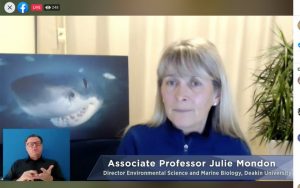 Environmental Science
Environmental Science
Associate Professor Julie Mondon, Director of Environmental Science, Deakin University
- There is a need to address concerns about plastics in terms of how we can reduce their input in the ocean and the impact they have on marine organisms. This problem it can be solved if we are more aware of what we are doing. Therefore, instead of ‘Reduce, Reuse, Recycle’, we need to be saying ‘Rethink, Reimagine, Respond’.
- Scientists must still be objective, even if they were to be forthright with passing their information to decision-makers.
- The increasing use of social media is providing politicians without scientific background a way to grasp an understanding of science, and of how knowledge is generated and can be used in legislation.
- People have to work on a more co-operative level when discussing issues that have a range of viewpoints, for instance, climate change.
- Many microplastics come from the breaking down of larger plastics, such as polar fleece. Once these smaller particles are removed from the fabric after washing, they can enter waterways and end up in the environment. Therefore, it is necessary to explore the use of plant-based, algae or bacterial materials as alternatives to plastics, such as scales or skins of fish. In some good news however, although microplastics pose a threat to marine life, there are some organisms that are selective and can actually prevent themselves from swallowing them.
- Politicians and leaders need to spend more on supporting research and technology to eradicate plastics in the ocean and prevent further impact. This has to be a long-term approach and something to act upon for the benefit of the next generation and those after.
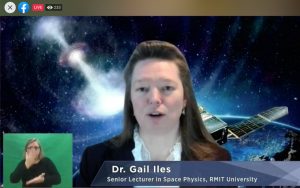 Space exploration
Space exploration
Dr Gail Iles, Senior Lecturer in Space Physics, RMIT University and Member of the Board of Directors, Space Industry Association of Australia
- The need to find materials and solutions that would reduce the amount of radiation so astronauts could travel further into space and be protected from illnesses such as cancer. Also, the work being done to reduce radiation exposure can be applied to protecting those in the medical field, such as radiographers.
- Satellite data can provide information on early warning of bushfires and also assist the agriculture industry with the capability to drive tractors autonomously to assist with farming activities.
- There will be an increase in satellites being launched to predict not only Earth’s weather but space weather. Space weather, which is influenced by charged particles emitted from the Sun, can create much damage to communications networks and radio signals that first responders use. It therefore needs to be monitored on a regular basis.
- Short visits to Mars are planned for 2035 where astronauts will go, land, stay for a duration of two to four weeks and then return to Earth as long as the technology has been provided for them to be protected from any associated illnesses. However, there are still a many technology challenges to address in terms of producing the type of spacecraft needed to reach the surface of Mars.
- The next visit to the Moon will be in 2024 through the Artemis program for which astronauts will explore the potential to create a permanent habitat. Also, all projects will be trialled on the Moon first in order to see if in the future, they can also be performed on the surface of Mars.
- Politicians need to consult with those in the realm of science to consider the solutions that can be used to determine appropriate strategies for future prospects. Moreover, events such as Science meets Parliament, are a great opening for both parties to engage with one another with the promise of resolving such matters.
The online forum provided fuel for discussion and offered an insight into how science can pave the path for a post-COVID-19 future.
Many thanks to the Royal Society of Victoria and the Parliament of Victoria for arranging this event to conclude National Science Week 2020.
Priya Mohandoss.
Priya Mohandoss is an RSV member and has a Bachelor of Science and both Masters of Media and Communications and Masters of Journalism from Monash University.
